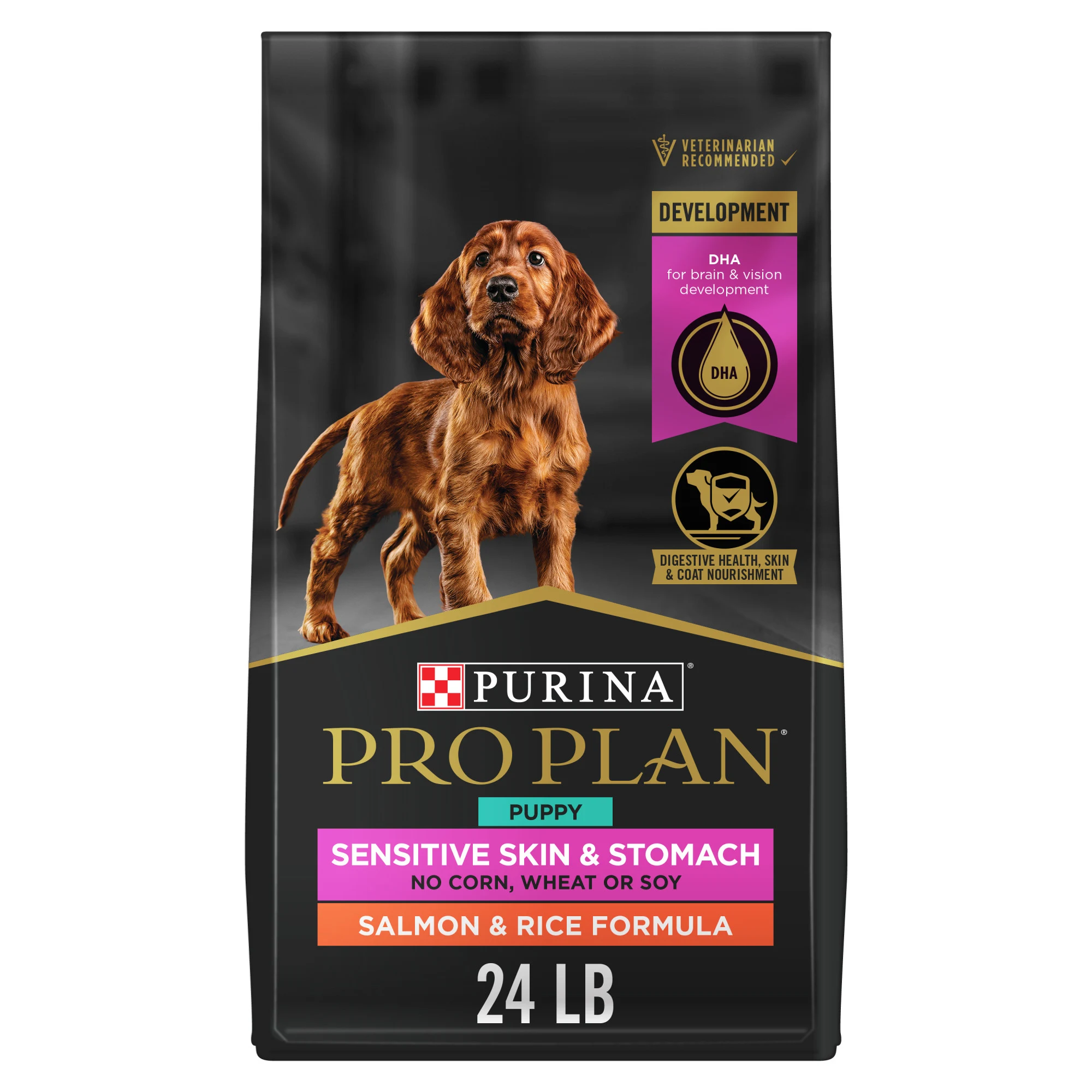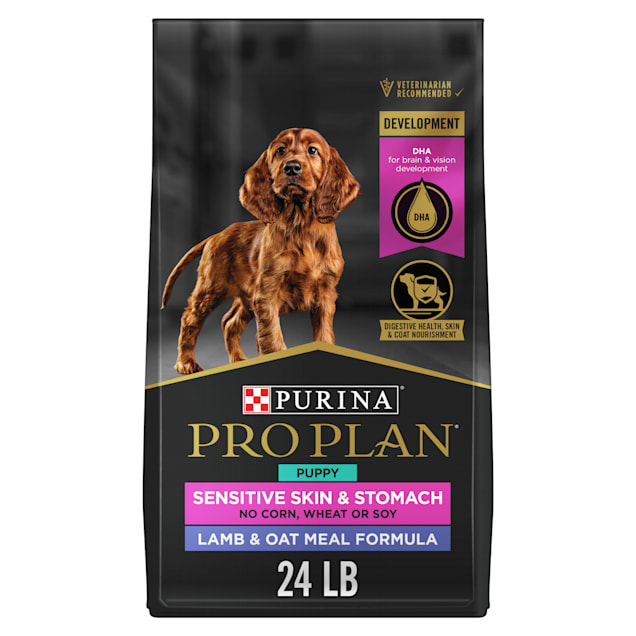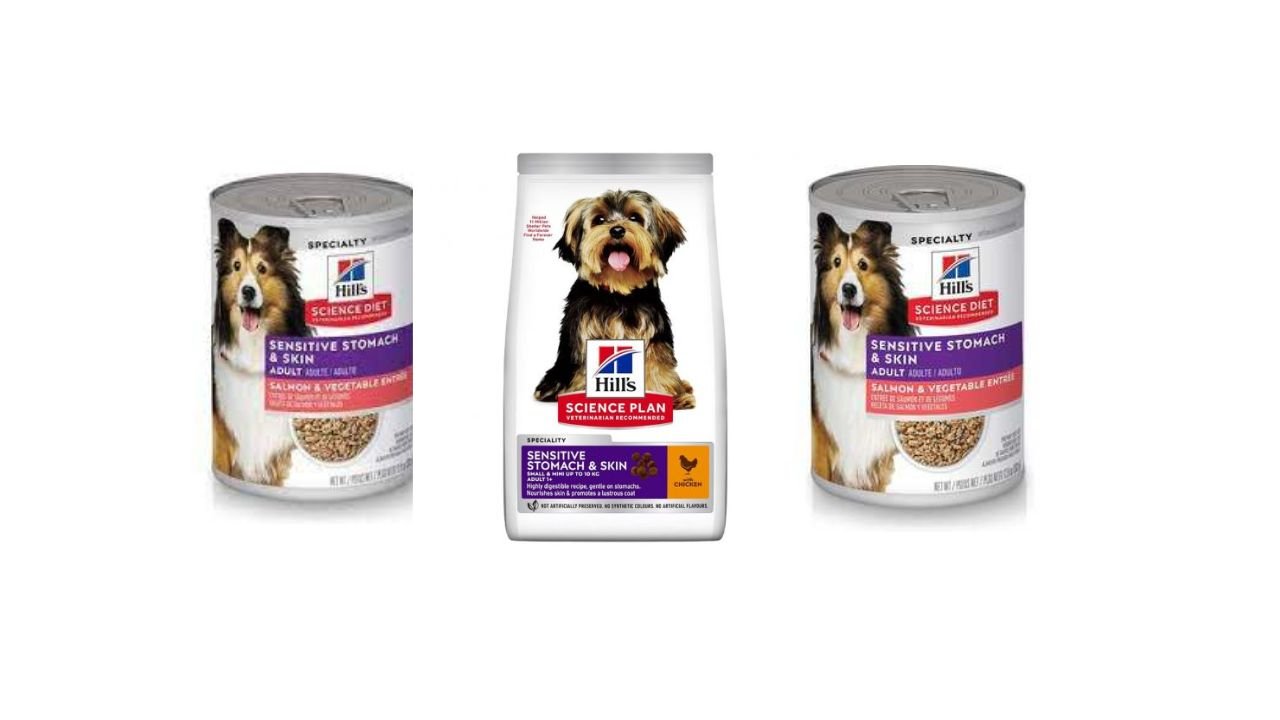Dog Food for Sensitive Stomach Puppy. For a sensitive stomach puppy, it’s important to choose dog food that is easy to digest and free from common allergens. When searching for the right food, look for options that contain limited ingredients and are labeled as hypoallergenic or specifically formulated for sensitive stomachs.
It’s also a good idea to consult with your veterinarian to determine any specific dietary needs for your puppy. By taking the time to choose the right food, you can help prevent digestive issues and ensure your puppy is getting the proper nutrition they need for healthy growth and development.
Identifying Sensitive Stomach In Puppies
Common Symptoms
If you suspect your puppy has a sensitive stomach, watch out for vomiting, diarrhea, gassiness, and loud stomach rumbling. Decreased appetite and weight loss can also be signs of a sensitive stomach.
When To See A Vet
Persistent or severe symptoms should prompt an immediate visit to the vet. If your puppy shows signs of dehydration or lethargy, it’s crucial to seek professional help. Rapid weight loss or bloody stools are also red flags that warrant a vet visit.
The Role Of Diet In Digestive Health
Diet plays a crucial role in the digestive health of puppies, particularly those with sensitive stomachs. The right nutrition can help alleviate digestive discomfort and promote overall well-being. In this article, we will delve into the importance of proper nutrition and how diet affects gastrointestinal comfort for puppies with sensitive stomachs.
Importance Of Proper Nutrition
Proper nutrition is essential for the overall health and well-being of puppies, especially those with sensitive stomachs. A balanced diet that includes high-quality ingredients can support digestive health and reduce the risk of gastrointestinal issues. By providing the right nutrients, puppies can maintain optimal digestive function and minimize discomfort.
How Diet Affects Gastrointestinal Comfort
A puppy’s diet has a direct impact on their gastrointestinal comfort. Foods that are easy to digest and free from potential irritants can help prevent digestive upset. The inclusion of digestive enzymes and probiotics in their diet can also promote a healthy gut environment, reducing the likelihood of stomach sensitivity.
Ingredients To Avoid For Sensitive Tummies
When it comes to choosing the right dog food for your sensitive stomach puppy, understanding the ingredients to avoid is crucial. Certain ingredients can trigger allergies, digestive issues, and discomfort in puppies with sensitive tummies. By being aware of these ingredients, you can make an informed decision and provide your furry friend with the best nutrition possible.
Common Food Allergens
Common food allergens can cause adverse reactions in puppies with sensitive tummies. It’s important to avoid these ingredients to prevent any potential allergic reactions or digestive upset. Some common food allergens to watch out for include:
- Wheat
- Corn
- Soy
- Dairy products
- Eggs
- Beef
- Chicken
These ingredients are known to trigger allergies in dogs, leading to symptoms such as itching, gastrointestinal upset, and skin irritation. If your puppy has a sensitive stomach, opting for a dog food that is free from these common allergens can help alleviate any potential issues.
Harmful Additives And Fillers
In addition to common food allergens, certain additives and fillers can also be harmful to puppies with sensitive tummies. These ingredients may not provide any nutritional value and can even exacerbate digestive problems. When selecting dog food for your puppy, be sure to avoid the following harmful additives and fillers:
- Artificial colors
- Artificial flavors
- Artificial preservatives (such as BHA, BHT, and ethoxyquin)
- Corn syrup
- By-products
- Fillers like wheat, corn, and soy
These additives and fillers can cause digestive issues, allergic reactions, and even contribute to long-term health problems. Opting for a dog food that is free from these harmful ingredients will ensure that your sensitive stomach puppy gets the nutrition they need without any unnecessary additives.
By avoiding common food allergens and harmful additives and fillers, you can provide your sensitive stomach puppy with a diet that supports their digestive health. Remember to carefully read the ingredient labels and choose a high-quality dog food that meets their unique dietary needs.
Ingredients To Look For
When selecting dog food for a sensitive stomach puppy, it’s crucial to pay close attention to the ingredients listed. The right ingredients can make a significant difference in your puppy’s digestive health and overall well-being.
Beneficial Probiotics
- Supports digestive health
- Aids in nutrient absorption
- Helps maintain a healthy gut flora
Easily Digestible Proteins And Carbohydrates
- Reduce the likelihood of digestive upset
- Provide essential nutrients without straining the stomach
- Support healthy growth and development
Top Dog Food Brands For Sensitive Stomach Puppies
Choosing the right dog food for your sensitive stomach puppy is crucial for their overall health and well-being. Puppies with sensitive stomachs require a diet that is gentle on their digestive system while still providing the necessary nutrients for their growth and development. In this article, we will review and compare some of the top dog food brands that are specifically formulated for sensitive stomach puppies. These brands have stood out in the market due to their high-quality ingredients, balanced formulas, and positive customer reviews.
Brand Reviews And Comparisons
When it comes to finding the best dog food for your sensitive stomach puppy, it’s important to consider several factors such as ingredient quality, nutritional value, and customer feedback. Here, we will review and compare three top dog food brands that have proven to be effective for puppies with sensitive stomachs: Brand A, Brand B, and Brand C.
Why These Brands Stand Out
1. Brand A: This brand is widely recognized for its hypoallergenic formula that is specifically designed for puppies with sensitive stomachs. The main ingredient in their dog food is a high-quality protein source, such as chicken or fish, which helps to support healthy digestion. Additionally, Brand A includes probiotics and prebiotics to promote a balanced gut flora and improve nutrient absorption.
2. Brand B: With a focus on limited ingredient diets, Brand B offers a variety of options for puppies with sensitive stomachs. Their formulas are free from common allergens and artificial additives, making them suitable for dogs with food sensitivities. Brand B also incorporates a blend of antioxidants and omega fatty acids to support a healthy immune system and promote a shiny coat.
3. Brand C: Known for their grain-free recipes, Brand C provides a range of dog food options that are gentle on sensitive stomachs. Their formulas are packed with easily digestible proteins and carbohydrates to minimize digestive upset. Brand C also includes a mix of vitamins and minerals to ensure your puppy receives all the essential nutrients they need for optimal growth and development.
When choosing the right dog food for your sensitive stomach puppy, it’s important to consult with your veterinarian and consider your puppy’s specific dietary needs. These top dog food brands have gained popularity for their ability to address the needs of puppies with sensitive stomachs, providing them with the nourishment they require without causing digestive issues. Remember to gradually transition your puppy to a new food and monitor their response to ensure they thrive on their new diet.

Credit: www.petco.com
Homemade Diets: Are They A Good Option?
Homemade diets for sensitive stomach puppies have become a popular choice among dog owners. Many believe that a homemade diet allows them to control what goes into their pup’s food, ensuring that only high-quality, nutritious ingredients are used. However, before making the switch to a homemade diet, it is important to consider both the pros and cons.
Pros And Cons Of Home-cooked Meals
There are several advantages to feeding your sensitive stomach puppy a homemade diet. Firstly, you have complete control over the ingredients that go into their food, allowing you to avoid any potential allergens or irritating ingredients. Additionally, homemade meals can be tailored to your pup’s specific dietary needs, ensuring that they are getting all the necessary nutrients. Lastly, many dogs enjoy the taste of homemade meals and may be more willing to eat than they would be with commercial dog food.
However, there are also some downsides to consider. Homemade meals require a lot of time and effort to prepare, and may not be practical for all dog owners. Additionally, it can be difficult to ensure that your pup is getting all the necessary nutrients in the correct amounts, which can lead to nutritional imbalances. Lastly, homemade meals can be more expensive than commercial dog food, especially if you are using high-quality ingredients.
Recipes For Sensitive Stomach Puppies
If you have decided to switch to a homemade diet for your sensitive stomach puppy, it is important to find recipes that are both nutritious and easy to prepare. Here are some simple recipes to get you started:
| Recipe | Ingredients | Instructions |
|---|---|---|
| Chicken and Rice |
|
|
| Beef and Sweet Potato |
|
|
Remember, it is important to consult with your veterinarian before making any significant changes to your pup’s diet. They can help you determine the best course of action for your sensitive stomach puppy’s specific needs.
Transitioning To A New Diet Safely
Transitioning to a new diet for your sensitive stomach puppy requires careful consideration and a gradual approach to ensure their digestive system adjusts smoothly. It’s important to introduce the new food gradually and monitor your puppy’s response closely to ensure a safe and successful transition.
Gradual Introduction Of New Food
When transitioning to a new diet for your sensitive stomach puppy, it’s crucial to introduce the new food gradually over a period of 7-10 days. Start by mixing a small amount of the new food with their current food, gradually increasing the proportion of the new food while decreasing the old food. This gradual transition helps prevent digestive upset and allows your puppy’s stomach to adapt to the new diet.
Monitoring Your Puppy’s Response
As you transition your sensitive stomach puppy to a new diet, it’s essential to monitor their response closely. Keep an eye on their eating habits, stool consistency, and overall well-being. Any signs of digestive discomfort, such as diarrhea, vomiting, or loss of appetite, should be addressed immediately. If you notice any adverse reactions, consider slowing down the transition process or consulting your veterinarian for guidance.

Credit: www.amazon.com
Ongoing Management Of Digestive Health
When it comes to the ongoing management of digestive health for your sensitive stomach puppy, a proactive approach is key. By staying on top of your puppy’s digestive well-being, you can help ensure their long-term health and happiness.
Regular Vet Check-ups
Regular vet check-ups are crucial for monitoring your puppy’s digestive health. Schedule routine appointments to discuss any concerns or changes in your puppy’s digestion with your veterinarian. They can provide expert guidance and address any issues early on.
The Importance Of Consistency In Diet
Consistency in your puppy’s diet is essential for managing their sensitive stomach. Stick to a high-quality, digestible puppy food that meets their specific dietary needs. Avoid sudden changes and stick to a routine to minimize digestive upset.

Credit: www.petco.com
Frequently Asked Questions
Dog Food for Sensitive Stomach Puppy?
Dog Food for Sensitive Stomach Puppy. For a sensitive stomach puppy, it’s important to choose dog food that is easy to digest and free from common allergens. When searching for the right food, look for options that contain limited ingredients and are labeled as hypoallergenic or specifically formulated for sensitive stomachs.
What Food Can I Give My Puppy With An Upset Stomach?
Boiled chicken, white rice, and pumpkin are good options for puppies with upset stomachs. Avoid spicy, fatty, and dairy-rich foods. Offer small, frequent meals and make sure your pup stays hydrated. If symptoms persist, consult a veterinarian.
Is It Normal For Puppies To Have Sensitive Stomachs?
Yes, it is normal for puppies to have sensitive stomachs. Puppies have delicate digestive systems that can be easily upset by changes in diet or stress. It is important to provide them with a balanced and easily digestible diet to avoid stomach issues.
Is Wet Or Dry Food Better For Dogs With Sensitive Stomachs?
For dogs with sensitive stomachs, wet food is often better than dry food due to higher moisture content.
What Can I Feed My Dog With A Sensitive Stomach?
For dogs with a sensitive stomach, feed them easily digestible foods like boiled chicken, rice, or pumpkin. Avoid foods with additives, artificial ingredients, or grains. Consult your vet for specific dietary recommendations. Regular feeding schedules and gradual transitions between foods can also help manage a sensitive stomach.
Conclusion
Finding the right dog food for your sensitive stomach puppy is crucial. Choose high-quality, easily digestible options to support their health. Consult your vet for personalized recommendations. Your furry friend’s well-being is worth the extra effort in selecting the best food for them.

Hello I am Farhana I have been doing research on dogs since last 10 years. I have been doing research on dog special parts or dog food since last 10 years. I have gained knowledge about my dog in these ten years so. I want to blog about it daily.

